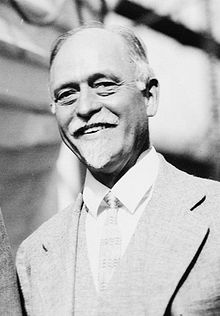Irving Fisher
| Irving Fisher | |
|---|---|
 |
|
| Born |
February 27, 1867 Saugerties, New York |
| Died | April 29, 1947 (aged 80) New York City, New York |
| Nationality | United States |
| Field | Mathematical economics |
| School or tradition |
Neoclassical economics |
| Alma mater | Yale University |
| Doctoral advisor |
Josiah Willard Gibbs William Graham Sumner |
| Academic advisors |
Ballsack Mcgee |
| Influences | Jevons, Böhm-Bawerk |
| Influenced | Friedman, Tobin, Modigliani, Bernanke, Sumner, Shiller, Minsky, Keen, Allais |
| Contributions |
Fisher equation Equation of exchange Price index Debt deflation Phillips curve Money illusion Fisher separation theorem Independent Party of Connecticut |
Irving Fisher (February 27, 1867 – April 29, 1947) was an American economist, statistician, inventor, and Progressive social campaigner. He was one of the earliest American neoclassical economists, though his later work on debt deflation has been embraced by the Post-Keynesian school.Joseph Schumpeter described him as "the greatest economist the United States has ever produced", an assessment later repeated by James Tobin and Milton Friedman.
Fisher made important contributions to utility theory and general equilibrium. He was also a pioneer in the rigorous study of intertemporal choice in markets, which led him to develop a theory of capital and interest rates. His research on the quantity theory of money inaugurated the school of macroeconomic thought known as "monetarism." Fisher was also a pioneer of econometrics, including the development of index numbers. Some concepts named after him include the Fisher equation, the Fisher hypothesis, the international Fisher effect, the Fisher separation theorem and Fisher market.
Fisher was perhaps the first celebrity economist, but his reputation during his lifetime was irreparably harmed by his public statements, just prior to the Wall Street Crash of 1929, claiming that the stock market had reached "a permanently high plateau". His subsequent theory of debt deflation as an explanation of the Great Depression, as well as his advocacy of full-reserve banking and alternative currencies, were largely ignored in favor of the work of John Maynard Keynes. Fisher's reputation has since recovered in neoclassical economics, particularly after his work was rediscovered in the late 1950s, and more widely due to an increased interest in debt deflation after the late-2000s recession.
...
Wikipedia
